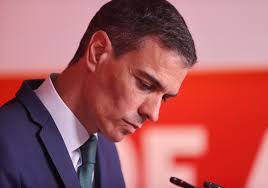 Is Pedro Gonzalez, arguably the best prime minister Spain has had in nearly 50 years of democracy, following the death of the fascist dictator General Franco, about to be forced to fall on his sword?
Is Pedro Gonzalez, arguably the best prime minister Spain has had in nearly 50 years of democracy, following the death of the fascist dictator General Franco, about to be forced to fall on his sword?
The English and Spanish Press is full of speculation after a harrowing seven days for the socialist (PSOE) leader of Spain's fragile coalition government.
[Photo courtesy of ABC]
Background
Seven years after taking office by ousting corruption-ridden conservatives from government, Pedro Sánchez is fighting for his political life amid investigations into alleged corruption in his Socialist party (PSOE).
On 12 June, an ashen-faced prime minister apologised to Spaniards after audio gathered by civil guard investigators was made public and appeared to show the PSOE secretary, Santos Cerdán, discussing commissions paid by companies in exchange for public contracts.
Sánchez has not himself been directly implicated, but the Socialist leader who came to power promising to clean up politics is now facing calls to resign from an invigorated opposition.
Cerdán, who was party number three, has resigned from the PSOE and stepped down as a member of parliament. He is due to appear before the Supreme Court on 25 June, this coming Wednesday. He maintains he has never committed a crime nor been implicit in one.
The investigation into commissions is part of an ongoing probe which has already implicated José Luis Ábalos, a former PSOE secretary and transport minister. A third person implicated is Koldo García, an advisor to Ábalos. Both men featured with Cerdán in the recently exposed audio. All three say they have done nothing wrong.
The investigation into Ábalos, which began last year, was damaging for the government but his exit from the cabinet and the PSOE secretary post in 2021 put distance between him and Sánchez. However, the implication of Cerdán is more problematic.
Sánchez had repeatedly defended him in the face of claims in the right-wing media over recent months that he was under investigation, and the prime minister even accused the opposition of "slandering honest people" when asked about Cerdán's activities last month.
The party secretary, from the northern region of Navarra, was a trusted confidant of the prime minister, playing a crucial role, for example, in negotiating the support of Catalan nationalists to allow the formation of a new government in 2023.
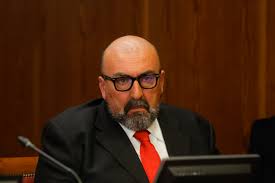
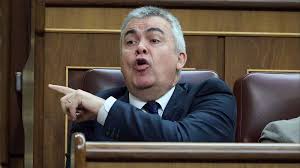
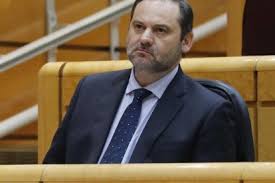
Koldo Garcia [RTVE.es] Santos Cerdan [ESdiario] José Luis Ábalos [El Mundo]
Despite acknowledging that he "should not have trusted" Cerdán, Sánchez has insisted that he will see out the legislature, which is due to end in 2027.
In a letter to PSOE members he apologised again, while doubling down.
"There are many issues that affect the lives of the majority – healthcare, housing, pensions, jobs, fighting climate change and defending equality – and for which it is worth fighting still," he wrote. "Challenges that are not solved with headlines or lynchings."
However, the opposition has presented the investigation as symptomatic of a corrupt regime, pointing to other probes affecting Sánchez and his circle.
Begoña, David and the Attorney General Problem
A judge has been investigating the prime minister's wife, Begoña Gómez, for possible business irregularities - and his musician brother, David, is due to go on trial for alleged influence peddling in taking up a public post in the south-western city of Badajoz.
Meanwhile, the Attorney General, Álvaro García Ortiz, is also likely to face trial for revealing confidential details of a tax evader. All three deny wrongdoing.

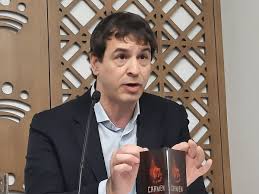
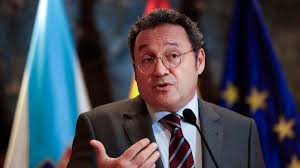
Begoña Gomez [La Razon] David Sanchez [El Confidencial] Álvaro García Ortiz [elDiario.es]
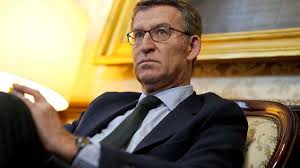 Sánchez and his supporters have cast these three affairs as part of a campaign orchestrated by the conservative People's Party (PP), the far-right Vox, right-wing media and factions within the judiciary. A number of judicial experts have expressed surprise at the zeal with which the investigations have been carried out.
Sánchez and his supporters have cast these three affairs as part of a campaign orchestrated by the conservative People's Party (PP), the far-right Vox, right-wing media and factions within the judiciary. A number of judicial experts have expressed surprise at the zeal with which the investigations have been carried out.
In a raucous parliamentary session this week, opposition MPs chanted "Dimisión" (Resign) at the prime minister, and Alberto Núñez Feijóo, leader of the PP, accused him of being "a wolf who has led a corrupt pack".
Alberto Núñez Feijóo [El Periódico]
Paco Camas, head of public opinion in Spain for polling firm Ipsos, sees a Sánchez resignation as "political suicide" for his party, because it would almost certainly trigger elections, allowing the PP to form a government, probably with the support of Vox.
"The overall trend right now is a demobilised electorate on the left, particularly for the Socialist party, and an enormous mobilisation of voters on the right, which is capitalising on the discontent with the government," Camas said.
Even the Socialist president of the Castilla-La Mancha region, Emiliano García-Page, has warned that "there is no dignified way out" for the PSOE.
However, as long as Sánchez can keep his fragile parliamentary majority of left-wing and nationalist parties together there is little the opposition can do to bring him down.
To that end, the prime minister has been frantically trying to reassure these allies, many of who have voiced outrage at the Cerdán-Ábalos scandal. Camas believes that persuading them to support a 2026 budget could be a way for Sánchez to buy some time.
Nonetheless, such plans could be left in tatters were more explosive revelations to emerge, as many in the Socialist party fear.
Such worries will be playing on Sánchez's mind as he heads to the Nato summit in The Hague.
Normally an assured presence on the international stage, he will arrive with serious doubts about his future and under mounting pressure to raise Spain's defence spending.
Although his government has promised to increase military spending to 2% of economic output this year, it has been resisting calls from the United States and the Nato leadership to raise it further. Sánchez has now refused to accept a target of 5% of GDP for military spending, saying it "would not only be unreasonable but also counterproductive".
The Guardian
'The final countdown': Spanish PM Pedro Sanchez fights for his political life.
Sam Jones
Series of allegations facing those around the PM have hit the reputation of the socialist-led minority government
Pedro Sánchez could be forgiven for remembering the autumn of 2018 with a deep and nostalgic sigh. Back then, having been in office for just six months, Spain’s socialist prime minister could afford to mock his opponents’ frequently hyperbolic attempts to depict him and his administration as an existential threat to the country.
“I know you think I’m a dangerous, extreme left-winger who’s trying to break Spain apart,” he told the senate at the end of October that year. “I know that everything I do, and everything my government does, is illegal, immoral and even fattening.”
Almost seven years on, that barb hasn’t aged well. The EU’s last centre-left leader is fighting the most crucial battle of his political life. The events of the past seven days – and, indeed the past year – have battered the reputation of Spain’s socialist-led minority government and of the man who came to power as a self-declared scourge of corruption.
Sánchez, 53, made Spanish political history in June 2018 when he became the first opposition leader to successfully use a motion of no confidence to oust a sitting government and become prime minister. By then, the conservative People’s party (PP) had been in power for seven years, was mired in corruption scandals and had just been irreparably damaged by a court’s ruling that the party had profited from an illegal kickbacks-for-contracts scheme. Its then leader, Mariano Rajoy, had also suffered the ignominy of becoming the first serving Spanish prime minister to give evidence in a criminal trial.
Unveiling his no-confidence motion, Sánchez complained that the PP had “seriously damaged the health of our democracy” and plunged the country’s politics into what he termed a “corruption thriller”.
It is another phrase that hasn’t aged well. Today it is his government and his circle that sit at the centre of a web of alleged plots that would seem too numerous, too unlikely and too convoluted for an airport novel.
The question now is whether the great survivor of Spanish politics will make it to the next general election, scheduled for 2027.
To mangle Hemingway’s line on going bankrupt, how does a government slide into ethical and electoral insolvency? “Two ways. Gradually, then suddenly.”
Last week, Sánchez’s right-hand man, Santos Cerdán, the organisational secretary of the prime minister’s Spanish Socialist Workers’ party (PSOE), resigned after a supreme court judge found “firm evidence” of his possible involvement in taking kickbacks on public construction contracts. His case is tied to those of two other men, the former transport minister José Luis Ábalos – who was Cerdán’s predecessor as the PSOE’s organisational secretary – and Ábalos’s former aide Koldo García.
Ábalos was sacked from Sánchez’s cabinet in 2021 and suspended by the PSOE in February last year after refusing to resign when García was accused of taking bribes to facilitate mask contracts during the Covid crisis. Both men have denied any wrongdoing.
Over the past few days, leaked evidence handed to the Guardia Civil’s anti-corruption unit has purported to show Cerdán discussing kickbacks with Ábalos and García, and Cerdán instructing García to interfere with the 2014 party vote that saw Sánchez elected PSOE leader. Audio of a crude discussion between Ábalos and García in which they appear to discuss the various attributes of different sex workers has also surfaced.
It’s little wonder then that Sánchez proclaimed on Thursday of last week that he should never have trusted Cerdán, who insists he is innocent. The prime minister’s accompanying mea culpa – “I have many shortcomings … but I have always believed in working for clean politics and fair play in politics” – came hours after the PSOE had denied that Cerdán had ever been involved in any conversations about taking bribes.
Those cases are not the only corruption allegations facing those around the prime minister. Both Sánchez’s wife, Begoña Gómez, and his brother, David Sánchez, are also under investigation.
Gómez is being investigated for alleged corruption and influence-peddling after a complaint by the pressure group Manos Limpias (Clean Hands), a self-styled trade union with far-right links that has a long history of using the courts to pursue political targets. Manos Limpias has accused Gómez of using her influence as the wife of the prime minister to secure sponsors for a university master’s degree course that she ran.
Sánchez has complained of being the victim of “lawfare” and has described the case against his wife as baseless and “an ugly fit-up driven by the far-right groups behind the complaint”.
The emergence of the allegations last year led him to take a five-day break from his public duties while he considered whether to carry on as prime minister.
David Sánchez, meanwhile, is facing trial over allegations of influence-peddling and other offences in a case that also began with accusations from Manos Limpias and other groups. He denies the charges.
It doesn’t end there. A former PSOE member has been accused of trying to wage a smear campaign against the Guardia Civil anti-corruption unit, which is also investigating Begoña Gómez and David Sánchez.
And Spain’s top prosecutor could face trial for allegedly leaking confidential information from a tax fraud case involving the partner of Isabel Díaz Ayuso, the populist PP leader of the Madrid region who is also one of Pedro Sánchez’s loudest and brashest critics.
No degree in political science is needed to see just how bad things are for the PSOE. Sánchez’s big worry now is that there could be still more damaging revelations to come about the activities of the “toxic triangle” of Cerdán, Ábalos and García. On Friday morning, Guardia Civil officers visited the PSOE’s Madrid HQ and the transport ministry to clone Cerdán and Ábalos’s email accounts.
Although the PP, now led by Alberto Núñez Feijóo, doesn’t yet have the votes it needs to bring a no-confidence vote against the government, the PSOE’s parliamentary allies – who include small Basque and Catalan nationalist parties – could decide that the socialist brand is too radioactive for them to be associated with.
In the meantime, Sánchez, a politician known for confounding expectations and opponents – and a man who famously called his 2019 memoir Manual de Resistencia (Resistance Manual) – is insisting that the PSOE is not institutionally rotten.
“I will not allow you to turn an anecdote into a category,” he told his adversaries during a loud and rancorous session in congress on Wednesday. “The left is not corrupt.”
The PP, which believes it may finally have Sánchez cornered, is not without its own issues. Ayuso – whose eccentric pronouncements tend to eclipse Feijóo’s more muted leadership style – is still under pressure over her boyfriend’s judicial issues with the tax authorities, and over her government’s Covid protocols after more than 7,200 people died in the region’s care homes during the early stages of the Covid pandemic.
The party is also facing continuing scrutiny over its response to last year’s deadly floods in Valencia, another of the regions it governs. Then there is its own well-documented history of corruption, not to mention the inconvenient fact that the PP is all but certain to have to rely on a deal with the far-right Vox party to govern.
But there is a growing sense that what was supposed to be one of Europe’s few remaining beacons of social democracy is dimming, even as the far right is gaining strength around the continent and beyond. If successive conservative and socialist governments in Spain are brought down by corruption scandals, the big winners are likely to be those, such as Vox, who rage against what they say is an old and rotten two-party system.
Recent events over the border in Portugal are also sobering. In last month’s snap election, the Portuguese socialist party – which was forced from government by a corruption scandal in 2023 – finished third behind the far-right Chega party. While a similar outcome in Spain is deeply improbable, Vox’s appeal – especially to young men – is increasing.
As the accusations mount, the achievements of the Sánchez administration risk disappearing under the rapidly accumulating weight of mud.
As well as delivering an enviably strong economy and calming the tensions in Catalonia after the failed 2017 push for independence, the government has, in conjunction with its successive, more leftwing partners, introduced menstrual leave, a minimum basic income scheme, a euthanasia law and updated abortion legislation.
Perhaps most eye-catchingly of all, Sánchez has also bucked the continent-wide political trend by defending immigration and its benefits.
“Spain needs to choose between being an open and prosperous country or a closed-off, poor country,” he told parliament in October. “It’s as simple as that.”
The coming weeks will determine the prime minister’s future, but some believe the days of the Sánchez government are numbered.
“As I see it, the legislature is already over,” said Pablo Simón, a political scientist at Madrid’s Carlos III University. While he acknowledged his view might sound harsh, he said the recent revelations were damaging precisely because they struck at the very heart of the PSOE’s progressive and administrative credibility.
Simón said the allegations of irregularities in the PSOE primaries, the apparent use of sex workers – “which breaks that whole image of a feminist government that believes in equality” – the perceived hypocrisy of a party that professed a zero tolerance approach to corruption, and Sánchez’s repeated cries of lawfare and conspiracy, now added up to a damning whole.
“With those four corners of the government’s narrative demolished, the situation is now terminal,” he said. “We don’t know how the legislature will end or when it will end, but we’re now in the final countdown … No one knows exactly what else could come out.”
STOP PRESS:
 At the recent NATO conference in The Hague (Netherlands) Pedro Sanchez appears to have isolated Spain from the other NATO countries over the issue of national contributions.
At the recent NATO conference in The Hague (Netherlands) Pedro Sanchez appears to have isolated Spain from the other NATO countries over the issue of national contributions.
He is literally out on a limb, being relegated to the fringe in photos of the leaders.
Photo of the NATO leaders in The Hague (Sanchez extreme right) [Reuters]
Donald Trump, who deigned to turn up, has singled out the Spanish prime minister for special criticism and has threatened to double import tariffs on Spanish imports to the USA.
MY JUDGEMENT:
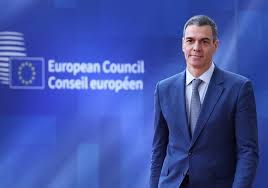 At first I thought Sanchez had made a major blunder, but with hindsight, and in the light of his statement at a Press conference at the Council of Europe in Brussels, I have concluded that he is being honest and true to Spain, her situation and her needs at this time.
At first I thought Sanchez had made a major blunder, but with hindsight, and in the light of his statement at a Press conference at the Council of Europe in Brussels, I have concluded that he is being honest and true to Spain, her situation and her needs at this time.
"España es un país solidario, comprometido con los estados de la OTAN, pero también soberano".
Sanchez at the Council of Europe in Brussels [ABC]
Sanchez has also criticised Donald Trump for attempting to meddle and peddle influence in the affairs of the European Union. The USA is not a member and never can be, thank God! Whilst the USA has an important stake in NATO (Will Trump really take the USA out of NATO, as he has threatened to do a number of times?), he has nothing to say in the EU. The Orange One really ought to shut up for a bit, and give everybody a break.
And as for Pedro, he has gone up again in my estimation. He is standing up to the bully from Florida, not like Sir Keir Starmer, the UK PM, who is too timid for my tastes, even though I am a supporter.
Links:
Bye, bye, baby - Bay City Rollers (1975) Bing Vídeos
El diario británico 'The Telegraph' define a Sánchez como "la pesadilla socialista española" - Periodista Digital
Sánchez responde a Trump tras su amenaza a España por el gasto en defensa: "España quiere tender puentes, no romperlos. Somos un país solidario"
© Paul Whitelock
Pictures:
ABC, BBC, elDiario.es, ESdiario, El Mundo, Guardian, Huffington Post, RTVE.es, Reuters, Telegraph, Wikipedia
Sources:
Brussels, Cadena SER, Council of Europe, El Confidencial, El Periódico, La Razón, MSN, NATO, Periodista Digital, RTVE.es, The Guardian, The Hague, The Huffington Post, The Telegraph
Tags:
Álvaro García Ortiz, Bay City Rollers, Begoña Gomez, "Bye bye baby", Cadena SER, David Sanchez, El Confidencial, elDiario.es, El Mundo, El Periódico, ESdiario, European Union, Feijóo, José Luis Ábalos, Koldo Garcia, La Razón, MSN, NATO, RTVE.es, Sanchez, Santos Cerdan, The Guardian, The Huffington Post, The Telegraph, Trump